I thought about including this review as a last minute addition to my ongoing “Feminine Sexuality in Cinema” series, since it fits right in. Ultimately though, I decided to just let it stand alone and be taken on its own terms.
I must reiterate, yet again, that it all started with Femina Ridens: that beautiful discovery which has led to so many rabbit holes for me to explore, from porn chic, to Stelvio Cipriani and his contemporaries, to Italian cinema. No other film I’ve ever encountered has broadened my horizons even half as much. So, every time I find another buried gem in its wake, I feel the need to pay homage to that movie yet again. Lately, I’ve been following Catherine Spaak’s filmography from the 1960s since she left such a huge impression on me in The Libertine. It’s led to some incredible films, several of which I now count among my all-time favorites. The one I want to focus on today is particularly special to me, and happens to be Catherine’s first ever starring role in a movie. This is I Dolci Inganni, known to English speakers as “Sweet Deceptions.” (And commonly referred to as “Les Adolescentes.”)
This film is officially 61 years old, but I’m gonna post a spoiler warning anyway, because I truly believe everyone ought to see it at least once.
A Young Woman’s First Love
The main character is a 17 year old girl named Francesca, and the entire film takes place over the course of one day in her life. The night before, she has a passionate dream about a 37 year old man named Enrico, who’s been a family friend since she was little. It’s an impossible schoolgirl crush, but she’s young and convinced this is true love. At least…she’s pretty sure. There’s still doubt in her mind if she should risk everything to confess her crush to him. Throughout the day’s events, Francesca considers how she feels and what to do about it: from going to school, to visiting a friend, to spending quality time with her brother, Eddy. She talks about love with anyone who will listen, in order to see what they think. She also people-watches other couples in order to get an idea of what being in a relationship means. More than anything though, Francesca appreciates how beautiful life suddenly is to her now that she has so much euphoria from her infatuation.
Unlike the protagonists in other “coming of age” movies, it never felt like Francesca was cynical towards, nor apprehensive of the adult society around her. She’s not the kind of girl who rolls her eyes at parents, or throws the word “phony” around. In fact, all through the film, Francesca makes an honest attempt to understand the adults in her life on their own terms, rather than scream about how no one does the same for her. (She even chooses to spend time with her friend’s mom instead of the friend herself at one point!) There’s also an adorable scene where Francesca, alone, stays behind to comfort a classmate whose love letter to another student has been discovered and mocked by their peers. Rather than dismiss the other girl as a social pariah, Francesca takes the opportunity to talk about love with a kindred spirit. She is such a cool kid, not in the prissy ‘n’ popular Regina George way, but in the Clarissa Darling way. She’s down to Earth, builds bridges with everyone, and tries to make her own small corner of the world a better place. This innocence and polite regard for others has the effect of endearing Francesca to the audience. We know this crush of hers is not going to work out. (It certainly wouldn’t be the ideal fantasy she’s built up in her head, in any case.) And yet, we want this sweet, naïve girl to walk away from such a complicated experience with her sense of wonder still intact.
I have to give this movie credit in that I never knew what was going to happen next while I was watching. I had no expectations of where I wanted it to go either, so I could just appreciate the ride and take in each scene as they came. Now that I know the ending though, I’d say Sweet Deceptions almost felt like an extended (and risqué) companion piece to my favorite episode of Clarissa Explains It All. (The first episode of season 2, where she gets a crush on the local weatherman.) Perhaps an even better comparison is Crazy Desire and Lolita, but from the girl’s point of view. Those two stories focused on the older men’s lust, which led them towards pursuing completely inappropriate relationships with teenagers. This one focuses on the misguided crush, as well as the desire to be treated like an adult, which lures young victims like theirs’ into bad situations. In Francesca’s case, after getting Enrico’s romantic affection, she begins to wonder if she actually wants it anymore. He reveals another side of himself, and perhaps it dawns on her what kind of sleazy 37 year old would even want to run away with an adolescent. Either way, Francesca returns home from her fling still uncertain of her emotional reaction to the day’s events. This is one of the film’s many quiet moments, where the camera holds on Catherine Spaak’s face for what feels like an eternity. For the first time, there is no one around for Francesca to process this new development with, so she has to mull it over alone. It’s left ambiguous exactly what she’s feeling, or what she intends to do next.
Love Hurts
One of the qualities I admire so much about Sweet Deceptions is that it feels like a film noir told from a teenage point of view. I’ve seen many hundreds of movies in my lifetime, but never have I witnessed a young woman’s feelings told in such a serious, respectful manner.* The cinematography has an indescribable “dark” quality to it (besides just being black and white) and the music sounds like it belongs in a seedy bar or lonely diner on a rainy night. The ambiance is more suited to the story of a jaded femme fatale, or grizzled detective, than an innocent young girl. As I’ve mentioned in other essays, I love it when art creates discordant emotions in the beholder, when it doesn’t hold your hand and tell you exactly what to think. I find that this technique encourages a deeper reflection in the audience; we are forced to analyze exactly what we feel and why, because we’re getting mixed signals. In this case, I believe the contrast between Francesca’s personality and the tone is meant to reflect the fact that she’s an innocent soul in a weary world–the only person in this story who’s never known heartbreak. (At least, not yet.)
*ASIDE: To build on this thought further, as an American who grew up in the post-Disney Channel, post-MTV media-scape, I’ve just never seen a movie like this before. Usually teen girl stories are loud, with soundtracks by the latest flash-in-the-pan pop star and lots of pastel pink in the color scheme. There’s always an emphasis on pop culture trends, popularity, cliques and materialism. (Gotta start wearing makeup at 12, gotta get the latest cellphone, gotta get tickets to the concert, gotta have a cool car, etc.) Sweet Deceptions is the exact opposite of that and is a better, more enduring work of art for it. I mean, I love Clueless and Mean Girls as much as anyone, but it’s refreshing to see a young girl’s journey told in the same dignified manner as mature classics like Casablanca. It’s like when I first found Femina Ridens, a film so brazen yet so brilliant, which seemed to fit a very specific niche I never knew could be filled. In both cases, I just sat there in awe, thinking: “why did it take me so long to find this wonderful movie?!”
Everyone whom Francesca interacts with is sad or broken in some way. (Not all of them suffer from troubles in their love life specifically, but I’m going to focus on those that do.) Her classmate gets mocked for trying to share a love note. Her new acquaintance, Renato, is in an unhappy relationship where his rich girlfriend belittles him in public. Francesca’s friend feels alienated from her as a result of this new crush. Each of them, explicitly or implicitly, counsels caution. Each encounter is an examination of the ways in which love can lead to pain, but Francesca is too blinded by rose tinted glasses to pay them any mind. And yet, even the object of her affections is divorced and has a nagging mistress who loudly berates him over the phone. In fact, the most generous interpretation of Enrico’s character is that he decided to take his chances with Francesca because he’s been sexually frustrated for so long that he got desperate. Suddenly a cute girl is literally throwing herself after him, presumably after years of disappointing flings and watching his ex get with someone else. So, he was willing to overlook the moral implications of his actions to pursue the only promising romantic interest left in his life. Of course, even if this were the case, it still doesn’t excuse what he did.
That’s certainly one way to look at Enrico. However, if we consider the details of his and Francesca’s relationship, I don’t think he deserves to get off that easily. It’s not just that he’s chasing after barely legal (in Italy) girls, as messed up as that is even by itself. He’s also known Francesca since she was little, which begs the question of how long he’s harbored these feelings. There’s even a line about how he used to bounce her on his knee when she was a small child. (It’s left to our interpretation if there was any grooming going on over the years or not.) After they’ve done the deed, Francesca makes the very reasonable request to go home and see her brother. Enrico suddenly becomes hostile, pressuring her to run away with him immediately. When she holds firm, he only communicates in curt, spiteful barbs from then on. He drives recklessly with Francesca in the car and pouts like a child. All this leads me to believe that Enrico is more of a nefarious predator than a mere sad sack taking whatever sex he can get. Luckily, judging from her mannerisms upon returning home, we can surmise that Francesca realizes this too.
However one interprets the ending, I think it’s pretty clear that Francesca lost her innocence that day. Not just in the physical sense, but in terms of her worldview. And that’s an understated tragedy, just like the lives of so many other characters in this film. Similar to another Catherine Spaak movie called The Girl From Parma, this felt like a story about real human beings with all too relatable problems. It’s a hard hitting narrative about people who’ve been beaten down and disappointed by life. It’s also a study in the many dysfunctional ways in which people express and receive love for one another. Love means opening oneself to a series of let downs and resentments, even if the initial period of infatuation seems so empowering. That’s the hard truth Francesca learns in this story; she realizes her idealized view of romance was nothing but a fleeting, sweet deception.
Francesca and Eddy
I admit that this is a strange superlative to bestow, but Francesca and Eddy have to be the cutest brother-sister duo in all of cinema. More than anything else, this was my strongest takeaway from the film. It’s so rare to see siblings, especially teenagers of opposite gender, have such an endearing relationship with one another in media. We (thankfully) never have to endure that scene, where Eddy finds out about his sister’s crush and teases her for it. Even when Francesca’s so obviously head over heels for Enrico, her brother never tries to embarrass her in front of him. (This is especially kind of Eddy, considering Francesca used him as a ride to get there, making the poor guy late for a rendezvous with his friends.) If we read between the lines, it’s possible that Francesca wanted Eddy specifically to take her to Enrico because she needed him there for moral support. (Remember that she ran away from Enrico earlier in the afternoon when he tried to pick her up from school.) Also, consider that after hooking up with Enrico later in the evening, her first thought is to see Eddy and talk things over with him. We are given every implication possible that Francesca adores her brother, and that he is her primary confidant.
My new favorite understated moment in any film occurs in the scene posted directly above. Notice how, around the 3:40 mark, Francesca grabs the top of the windshield for balance while riding on the hood of the car. It only lasts a split second, but Eddy reaches out and takes his sister’s hand supportively. It’s such a subtle but protective gesture which conveys their entire relationship to the audience. Eddy is a great brother, the kind who drops everything to pick up his sister from an out-of-the-way bar, even when he’s in a hurry. The kind of guy who, annoyed though he may be at the inconvenience, would never deliberately hurt Francesca nor allow her to come to harm. A guy who can tell what his sister’s after immediately (“So, you want to see Enrico?”) and continues to go out of his way for her regardless, just to make her happy.
During the scene posted directly below, notice how every time Enrico encourages Francesca’s attraction, we get a reaction shot of Eddy looking uncomfortable with the situation. On the surface, it seems like a pretty standard response to watching your sister flirt while you’re stuck as a third wheel. However, my interpretation of these cutaways is that Eddy’s worried his sister is cozying up to a creep and too smitten to notice the red flags. The whole sequence in the renovated house is such an effective piece of dramatic irony for this reason, where both Eddy and the audience have alarm bells going off like crazy on Francesca’s behalf. He clearly knew why his sister wanted to go there from the beginning (“Want me to leave you two alone?”) but probably never suspected Enrico would be into it. I think Eddy was probably hoping Enrico would be disinterested and let Francesca down easy. Then he could show his sister a nice time, maybe set her up with one of his friends, and they’d forget all about it. Unfortunately, the heart wants what the heart wants, and wild horses couldn’t drag Francesca away from her crush at this point in the narrative.
After the two lovers leave Eddy alone at the house, we get one last shot of him sitting in the chair, looking around in obvious discomfort. Initially I assumed it was because he was antsy to leave and meet up with friends–something he’s been complaining since they arrived. When Francesca and Enrico return to find that Eddy has vanished, one would logically assume that he went to join up with his buds. After letting the film sink in for a day, however, I now believe Eddy may have actually left to get help–either from their parents or someone else. It’s the only course of action which makes sense considering the way his character, as well as their relationship, has been developed thus far. Eddy outright abandoned his fun night out to make sure Francesca would be okay, in keeping with the central themes of the movie. (Those we adore can hurt us most, and people do crazy things for love.) Perhaps Eddy wasn’t home yet in the final scene because he was one step behind the two, returning to the abandoned house and then to Enrico’s apartment in search of Francesca. Or maybe he thought they weren’t coming back to the house at all, and left to find them immediately without going for help. (Obviously he didn’t get there in time, if this is the case.) It’s either that, or Eddy abandoned his beloved sister with someone he knew was planning on taking advantage of her. Considering the very deliberate context clues, I don’t think he’d be so careless with Francesca’s well-being.
Eddy’s protectiveness towards Francesca was the lone ray of hope in an otherwise bittersweet story full of disenchanted people living out unfulfilling romances. While Eddy wasn’t able to prevent the person he cares about from being hurt by the lecherous people around her, with his support I think Francesca will get through this incident and emerge wiser for the wear. Theirs was the one pure love of the film.
Conclusion
I think sometimes we all need the sad movies, if for no other reason than to know that other people have experienced the same problems we have. Often, hearing another person talk about their struggles, even indirectly via art, can help us put our own perspective into words. It’s an important healing process in an increasingly impersonal, screen-enclosed society which lets us feel heard. The world will always be a sick, cruel place, but at least we can commiserate with each other about shared pain, even just in absentia. In cases where you can’t exactly relate to a fictional characters struggle, maybe that builds empathy towards people who are different. (I don’t know, to my knowledge there’s never been a study on such a thing, but it’s a nice hope.) I’d like to believe this effect compounds when stepping outside your own country’s culture and enjoying something from a foreign land. With all of that in mind, enjoying media is not mere escapism, because that particular term implies an unwillingness to acknowledge the uncomfortable realities of the world. What I’m describing is sort of a shared coping mechanism, an exercise in empathy between the audience and the art. (As well as individual audience members with each other.)
ASIDE: This applies as long as we all remain active-watchers of the media we consume. Unfortunately, it seems like a disconcerting number of modern viewers treat cinema as a passive activity, prioritizing the action and spectacle over nuanced story and characters. As a lover of the craft, and an avid collector of a style of filmmaking which seems to be disappearing, it makes me sad. I wish I could talk about Sweet Deceptions and some of these other Italian movies with others, but few of my friends are willing to watch anything in black and white, let alone 60+ years old and from another country. Even online, there’s a lack of conversations regarding these movies for me to contribute to. It’s as though I’ve never empathized so strongly with a collection of films, yet I’ve never been more isolated from my peers as a result of this choice in media. (Forgive me if I sound like a contrarian snob, but I just had to get that off my chest. I wish the media I love was popular enough that I had someone to discuss them with 😦 )
With that concept in mind, what really endears me to Catherine Spaak movies, and Sweet Deceptions in particular, is that she brought to life many experiences of being a young woman which I sadly missed out on. Most of her early projects took place from a woman’s POV, usually with a focus on sexuality and relationships. The basic setup of a girl navigating a (series of) romance(s) stays the same, but each character’s background, what sex means to her, the dynamic she has with her partner(s), is different. Catherine Spaak’s filmography is like a prism of love as well as the female experience. It’s all the various ways, good and bad, in which men and women have courted each other. (I’ll talk about the rest of her filmography in a future post.) Catherine Spaak and/or her agent/manager are to be congratulated on choosing such fantastic scripts to work on over the years; it’s almost like her early filmography exists as an interconnected work of art in and of itself. Unfortunately, American movies about women’s stories, then and now, just don’t seem to have the same craftsmanship, depth or sincerity behind them, generally speaking. (That’s if we even get films with a female main character at all. It seems like the Italians, for whatever reason, were more willing to produce female-centric stories.)
I don’t typically believe in rankings or awards for movies, but I think a compelling argument could put forth that I Dolci Inganni is the greatest film ever made. Certainly it’s the most successful in depicting this exact perspective, as well as evoking this precise series of emotions. I used to think American Graffiti, Saturday Night Fever and John Hughes’ various ’80s films would always remain the best in the “coming of age” genre, until I discovered this. I was absolutely shocked when I set out to buy Sweet Deceptions on Blu-ray and found that it’s never been released on an HD format–on either side of the Atlantic. DVDs are out of print and prohibitively expensive as well, to say nothing of the limited release soundtrack album. (I purchased a copy of this rare, 300-pressings-only CD, because the music is gorgeous and I can’t find online downloads or streaming of it anywhere. But I paid a hefty sum for the privilege, let me tell ya.) Please, Criterion, Nucleus Films…somebody…restore and release this unsung masterpiece! It’s a timeless work of art which deserves far wider recognition than it’s received.






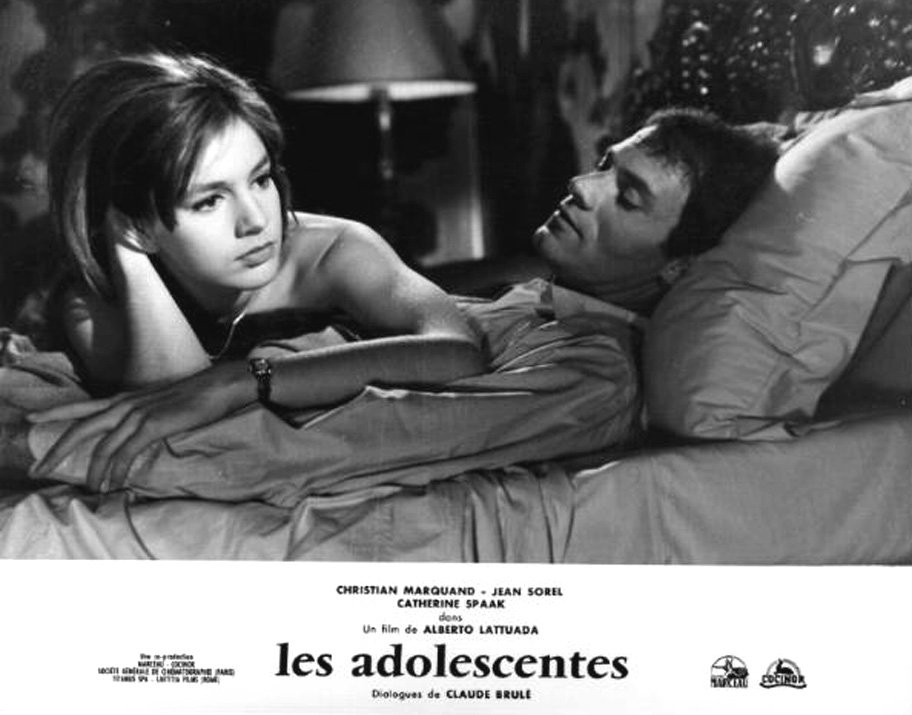


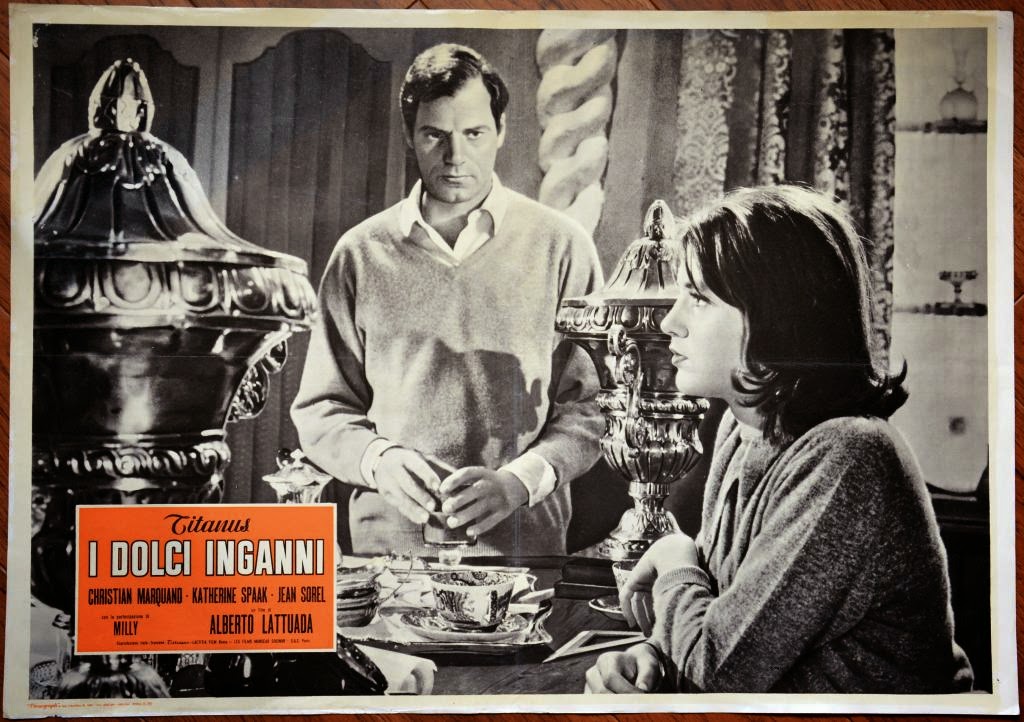

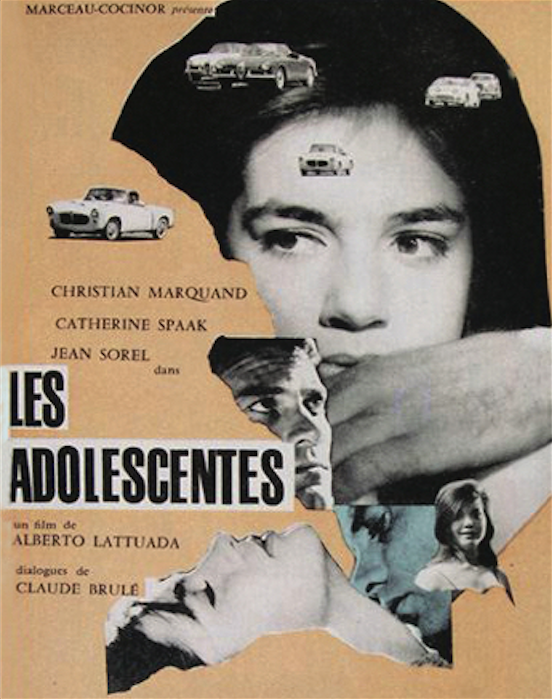





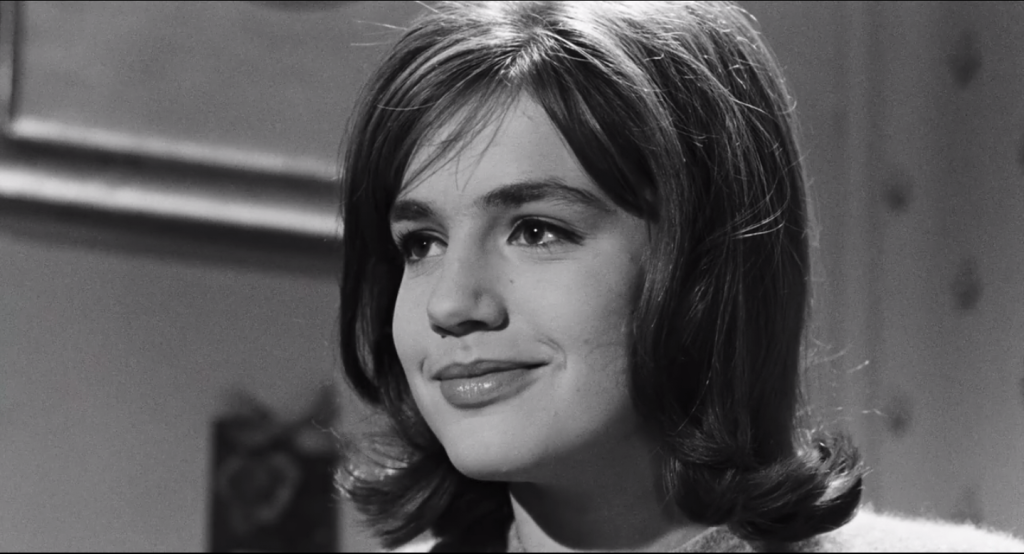
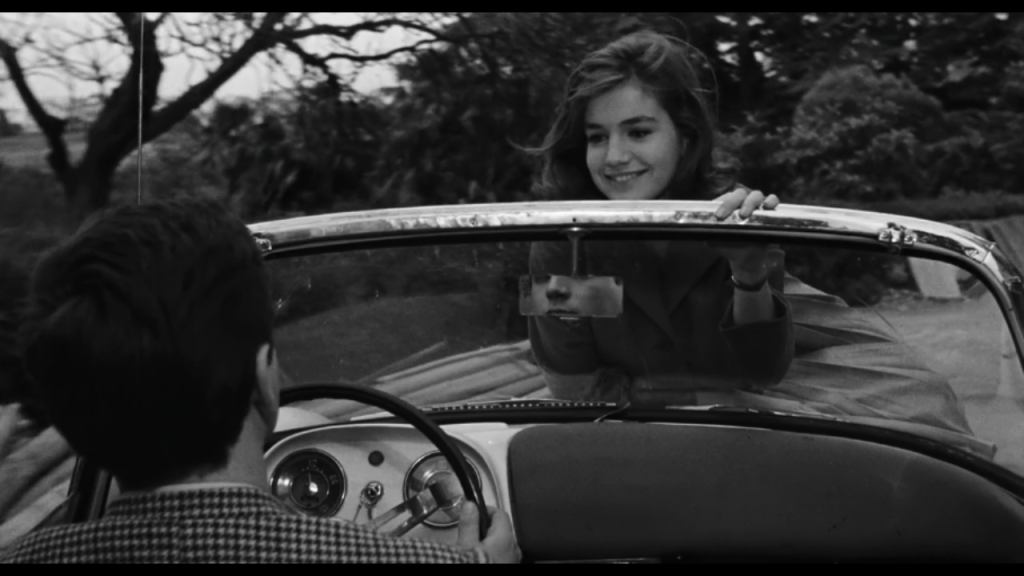

Beautiful review of this deep mostly overlooked movie that deserves, as you point out much more recognition. I can tell that for you writing this was a labor of love. You have a keen sense of observation, seeing things in a film others often overlook. Your in depth character analysis is superb. Reading this makes me even more proud that I can call such a talented insightful writer my best friend. Wow I don’t know what more to say, except excellent work Cassandra!
LikeLike
Thank you for uploading Piero Piccioni’s wonderful OST to your YouTube channel. It has so much variety – I really like the organ, sort of a cross between silent film stuff and Jimmy Smith. I didn’t know “J’attendrai” was originally an Italian song. It’s music like this that helps to keep one positive. 😉
LikeLike
Yeah, the soundtrack for this film is very different from most of the other work Piccioni did in the 60s. It’s less “sexy lounge music that makes me feel happy” and more “film noir music that makes me feel slightly unnerved.” Several of the tracks, like “The Old Villa,” feel incredibly foreboding, which suits the movie well. What makes *I Dolci Inganni* so magnificent is the dramatic irony which builds the moment we learn Enrico’s age. From then on, we are forced to watch this likable, kindly young woman walk into a dangerous situation in blissful ignorance of the warning signs. We are watching a girl lose her beautiful romantic fantasies the same way we all have, so we feel her pain. The organ, in my opinion, conveys the idea that we’re witnessing a funeral for Francesca’s innocence. While it’s not as melodic as the soundtrack to, say, *Scacco alla Regina,* it wasn’t meant to be.
LikeLiked by 1 person
Having recently watched the film (which I loved!) and hearing the soundtrack in context, I agree with your interpretation of the organ’s role in the score. Indeed, it sounds almost mocking at times, as if to say loss of innocence is an inevitability.
LikeLike
For those interested in seeing the complete movie, it’s here:
OK, so it’s subtitled in Hungarian. But don’t let that deter you. I found that after reading Cassandra’s enlightening essay and its sequel and watching the embedded English-subtitled clips and others on YouTube, I had enough information to be able to follow and enjoy the version linked above. The subtitles aren’t intrusive and are even helpful at times. And the sound of Italian being spoken is a joy in itself.
For completeness’ sake, here is the only list of English subtitles I could find:
https://transcripts.thedealr.net/script.php/sweet-deceptions-1960-DzQ
LikeLike
Cassandra tells me there is a new (2022) Italian biography of Catherine Spaak, written after her recent passing. This may or may not be the jacket blurb, with thanks to Google Translate plus a modicum of tweaking by asavinio:
“‘It seemed right to me’, says author Fernando Fratarcangeli, ‘to remember the extraordinary career of this artist who has always stood out for her professional elegance in every field she has embraced. I like to consider it a tribute to a great artist, to a great woman.’ *Catherine Spaak: Icona del nostro tempo* traces the actress’s cinematic career, her entire discography and many anecdotes from her life. Embellished with many photos, movie posters and record covers, the book contains a QR Code for listening to a playlist of thirty of her songs chosen by the author.”
This should give you a glimpse inside:
LikeLiked by 1 person
Yep thats it. I hope to splurge on a copy soon
LikeLiked by 1 person
That’s the spirit! 🙂
As for that elusive peek inside, maybe clicking on “read sample” will do the job:
https://www.amazon.com/CATHERINE-SPAAK-nostro-Storie-Italian-ebook/dp/B0B2T94MYJ
LikeLike